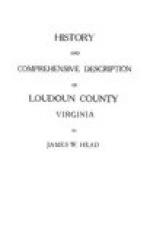Shortly after the convention began its deliberations a mass meeting was held in Leesburg, where the secession sentiment was practically unanimous, for the purpose of adopting resolutions to be sent to that important body recommending the immediate passage of the ordinance of secession. The citizens were addressed by Col. J.M. Kilgore and others.
The vote in Loudoun for the ratification or rejection of the ordinance of secession, while not close, was somewhat spirited and marked by slight disturbances at the polls. In practically every precinct outside the German and Quaker settlements a majority vote was cast in favor of secession.
No county in the State eclipsed Loudoun in devotion to the principles on which Virginia’s withdrawal from the Union was based, and the courage displayed by her in maintaining these principles made her the acknowledged equal of any community in the Southland.
Loudoun’s Participation in the War.
A discussion in this volume of the great Civil War and its causes has at no time been contemplated, and vain appeals addressed to surviving Confederate soldiers and Government record keepers long ago demonstrated the impracticability of a thorough account of the part borne by Loudoun soldiers in that grand, uneven struggle of 1861-’65. Their exact numbers even can not be ascertained as the original enlistment records were either lost or destroyed and duplicates never completed.
It may with truth be said that the extent of the service rendered by Loudoun in this, as well as preceding wars, will never be fully known or adequately appreciated. However, certain it is that thousands of her sons espoused the cause of the Confederacy, hundreds died in its defense, and not a few, by their valor and devotion, won enduring fame and meritorious mention in the annals of their government.
At home or in the ranks, throughout this trying period of civil strife, her people, with no notable exceptions, remained liberal and brave and constant, albeit they probably suffered more real hardships and deprivations than any other community of like size in the Southland. There were few Confederate troops for its defense, and the Federals held each neighborhood responsible for all attacks made in its vicinity, often destroying private property as a punishment.
Both armies, prompted either by fancied military necessity or malice, burned or confiscated valuable forage crops and other stores, and nearly every locality, at one time or another, witnessed depredation, robbery, murder, arson, and rapine. Several towns were shelled, sacked, and burned, but the worst damage was done the country districts by raiding parties of Federals. Much of the destruction is now seen to have been unnecessary from a military point of view.
Whole armies were subsisted on the products of Loudoun’s fruitful acres. Opposing forces, sometimes only detachments and roving bands, but quite as often battalions, regiments, brigades, and even whole divisions were never absent from the County and the clash of swords and fire of musketry were an ever-present clamor and one to which Loudoun ears early became accustomed.




